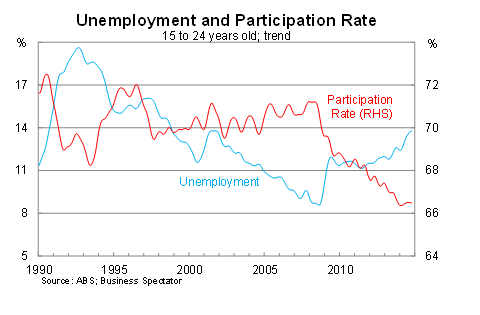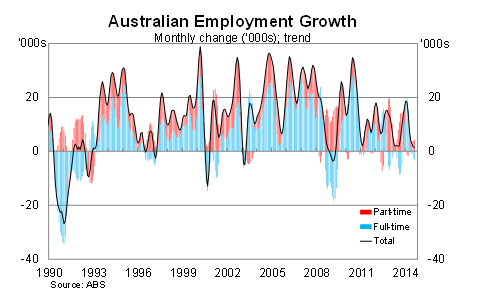Abbott's flawed attack on youth unemployment
The Abbott Government is proudly taking its war on youth to the global stage. Its welfare reforms -- already blocked by the Senate -- are a winner according to the Coalition and a key pillar towards its attempt to create an additional 2 per cent of real GDP over the next five years.
According to Fairfax media, the federal government rates “employment welfare reforms” as its number two commitment towards reaching the G20 growth target. The controversial set of policies are included in a draft of the G20 growth strategy to be presented at the G20 leaders' summit this month.
The problem, of course, is that there is no evidence that these policies will lift aggregate demand or encourage greater labour force participation. To the contrary, these policies appear to be mean spirited and ideology driven; fodder for the ‘A Current Affair' crowd but with no underlying economic benefits.
The centrepiece of the Coalition's welfare reform is its ‘Work for the Dole' scheme. Under the proposal, Australians aged 18 to 30 would be required to work 25 hours per week to receive their welfare payments. Those aged between 31 and 49 will have to work 15 hours.
‘Work for the Dole' has an intuitive appeal. As a country built on egalitarian principles, the idea that an individual receives something for nothing has never been popular. Surely gaining work experience and skills in return for a welfare cheque is a good thing, right?
Unfortunately such schemes rarely offer useful work experience and research shows that the scheme may in fact make it more difficult to find a new job. Research in 2004 by Jeff Borland and Yi-Ping Tseng of Melbourne University found that “there appear to be quite large adverse effects of participation in [work for the dole]” (Why work for the dole doesn't work, July 28).
The policy effectively distracts job seekers from useful activities by crowding out their time with menial work. Job applications take time and writing quality job applications is almost a full-time job.
The Abbott Government may very well be right in saying that such schemes encourage greater job seeking; however, that misses the most important part of the equation: where are the jobs?
Unfortunately the Abbott Government has fundamentally misdiagnosed the cause behind the sharp rise in youth unemployment. It sees a generation of losers; people who would prefer to live off the government rather than suffer an honest day of work.

That narrative is simple and has an intuitive appeal. It avoids asking tough question; particularly those without simple answers.
The reality, though, is that youth unemployment and welfare benefits would be lower if the Australian economy was generating more jobs. That might sound simple but the solution really is that simple. Pursue policies that increase economic activity and reduce distortions that discourage work and productive investment and the problem will solve itself.
How is the Coalition tracking so far? Its official position is to generate one million jobs over a five-year period.
That sounds ambitious but if achieved would actually reflect a sustained period of sub-par employment growth. The Hawke and Howard governments pushed those numbers with ease and while they benefited from favourable demographics -- including the sharp rise in female participation -- the overall population and the economy is now much larger.
The reality, though, is much bleaker. In the 13 months since taking office, the Australian economy has created 116,900 jobs. At that rate it'll take nine years to create one million jobs and the task may become more difficult as both the mining and automobile sectors cut thousands of positions over the next couple of years -- not to mention the ongoing decline in manufacturing.

I'm not against cutting welfare benefits if the time is right. During an economic boom, a prolonged period of unemployment is usually the fault of the individual rather than the economy. During weak times, the roles are reversed.
The time for cutting welfare payments was during the mid-2000s. The economy was in a sweet spot and welfare recipients, as a share of the population, was actually higher than it is now. Since then welfare benefits have declined a little -- due to strong growth -- but we avoided the need for reform.
Young Australians are unemployed because the economy has failed to create sufficient opportunities. That's not their fault and cutting their welfare cheques will make not a bit of difference to their employment outcomes. The most likely scenario is an increase in inequality and poverty; hardly the recipe for long-term sustainable growth.
Unfortunately these welfare policies are just one small part of the federal government's ongoing war against youth. Whether it be unemployment or university fees or climate change or housing policy, there has been one underlying truth: if you are young you're going to get screwed.
This is a federal government which is solely interested in achieving short-term gains at whatever cost. However, when it comes to its G20 growth agenda its desire to cut welfare payments won't even achieve that.
A serious growth plan -- and at this stage the Coalition should definitely have one -- must address the shortfall in aggregate demand while also looking at ways to increase supply through higher investment and incentives to hire more staff.
The youth unemployment crisis -- and the elevated unemployment rate more generally -- is hardly the Coalition's fault. But it is now the one in charge and must be held accountable for the new policies it proposes. Cutting unemployment benefits will not generate growth and it would be misleading to suggest otherwise.













